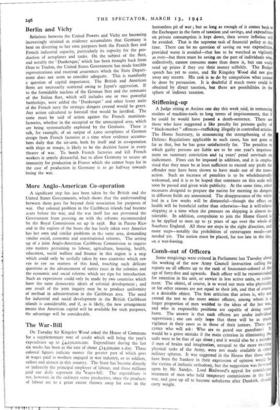Comb-out of Officers
Some misgivings were evinced in Parliament last Tuesday about the working of the new Army Council instruction calling for reports on all officers up to the rank of lieutenant-colonel of the age of forty-five and upwards Each officer will be recommended for retention in his unit, or service in less active units, or retire- ment. The object, of course, is to weed out men who physically or for other reasons are not equal to their job, and that of course is a desirable object. The first criticism that arises is, why not extend the test to the more senior officers, among whom is a larger proportion of men wedded to the ideas of the last war, and who in responsible positions are capable of doing more harm. The answer is that such officers are under individual supervision ; one can only hope that there will be as much vigilance in their cases as in those of their juniors. There are cynics who will ask: Who are to guard our guardians? It would be a grave mistake if the main criterion in eliminating the unfit were to be that of age alone ; and it would also be a mistake if men of brains and imagination, unequal to the more exacting physical tasks of the Army, were not made available in oche military spheres. It was suggested in the House that those who have been the frankest in their expression of opinion would be__, the victims of inelastic orthodoxy, but the suggestion was frowned upon by Mr. Sandys. Lord Birdwood's appeal for considerate treatment of men who held temporary commissions in the last war, and gave up all to become subalterns after Dunkirk, should carry weight.


























 Previous page
Previous page